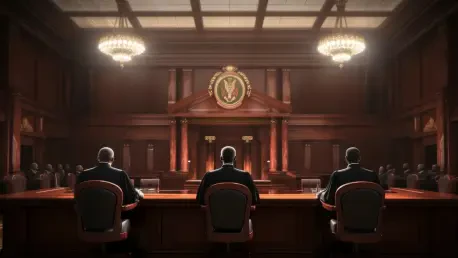America’s trade policies are being challenged as courts weigh in on the legality of presidentially imposed tariffs. The legal conflict centers on balancing judicial review and executive authority amid increasing global intricacies. The Trump administration’s tariffs faced legal scrutiny, revealing tensions between courts and presidential powers.
Legal Implications of Presidential Trade Law
This ongoing saga underscores the intricate dynamics within the U.S. legal system, shining a light on its influence on global negotiations. As the U.S. Court of Appeals for the Federal Circuit intervened to allow tariffs despite contrary rulings from the U.S. Court of International Trade, the stakes grew higher in diplomatic talks worldwide. The administration argued that these tariffs were integral to its international strategy, illustrating a clash between legal processes and executive ambitions.
A Clash of Judicial and Presidential Powers
Gripping legal arguments unfolded as courts and presidential authority collided over trade. Central to this dispute was the stay granted by the U.S. Court of Appeals to pause the lower court’s decision, allowing tariffs to remain in place while diplomatic negotiations were ongoing. This temporary stay emphasized the judiciary’s critical role in monitoring executive decisions, illuminating previous case studies where courts intervened in foreign policy. The consequences of such judicial discretion reflect the delicate balance of power in the United States.
Analyzing Opinions from Legal and Economic Experts
Legal experts and trade analysts weighed in on these developments, providing insights into the balance of authority between judicial bodies and the executive branch. Experts highlighted the potential impact tariffs have on global diplomacy, emphasizing their role in negotiating international trade deals. An economist remarked, “The courts’ intervention reflects a need to reassess executive power in trade matters.” Anecdotes from diplomats involved in the process further enriched understanding, sharing how such legal proceedings influence international relations.
Navigating Future Trade Policies: Strategic Considerations
In navigating this complex relationship between courts and presidential powers, distinct strategies emerge. Ensuring judicial oversight without hindering executive trade policymaking becomes an area of concentration. Such frameworks aim to resolve future disagreements between courts and administrations, offering potential methods to harmonize economic affairs. As diplomatic tensions simmer, businesses and consumers remain vigilant, preparing for fluctuations in tariffs and their broader implications on trade negotiations.
Moving Forward with Trade Dialogue
The legal tensions surrounding presidential tariffs propelled American trade into a critical realm of international diplomacy. Courts played a fundamental role in shaping these policies, forging new paths for balancing judicial oversight and presidential authority. As debates about the scope of presidential power in trade policy persisted, those involved found ways to address legal challenges. Nevertheless, stakeholders recognized the possibility of evolving frameworks that could secure balanced trade dialogues in the future.









